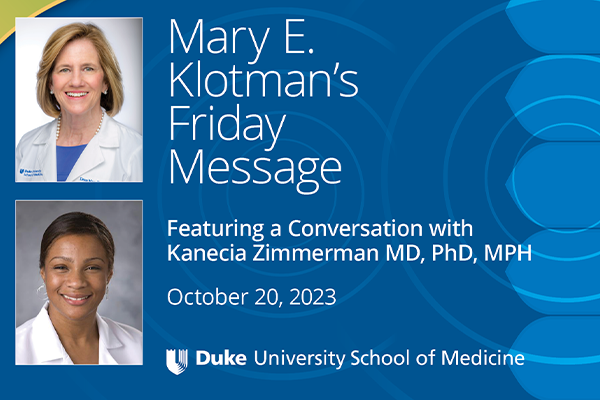Antibody Targets Deep-Seated KRAS Cancer Mutations
Immunologist Jose R. Conejo-Garcia, MD, PhD, unveils an antibody that successfully targets once-untreatable KRAS cancer mutations.
EDI Spotlight: Sexual and Gender Diversity Advisory Council
The Sexual and Gender Diversity Advisory Council (SAGDAC) is a think tank that helps support collaboration and a wide range of innovative LGBTQ+ initiatives across Duke.
Duke Researchers Probe the Magic of Psychedelics as Medicine
Duke scholars are studying how hallucinogenic drugs might become alternative treatments for medical-resistant conditions.
Viviana Martinez-Bianchi, MD, FAAFP, Named President-elect of the World Organization of Family Doctors
Viviana Martinez-Bianchi, MD, FAAFP, director of community engagement and assistant professor in the Duke Department of Family Medicine and Community Health and has been selected as President-elect of the World Organization of Family Doctors (WONCA), after a successful campaign.
Medical Spanish Course Recognized at National Competition
A student-led presentation on the Medical Spanish Course at Duke won second place in a poster competition at the Joint National Meeting for the Medical Organization for Latino Advancement (MOLA) and the National Association of Medical Spanish.
What an Animated Taco Reveals About Curiosity and Patience
New research shows that curiosity can prioritize the journey over the outcome
Margolis Center for Health Policy Proposes to Grow Into a University Institute
Margolis Center leaders told the Academic Council last week that the next step for the center is to become an institute to help raise Margolis’ external reputation, recruit new faculty and grow its educational efforts.
Duke Celebrates Open Access: Breaking Barriers for Quality Research
Sifting through information can be overwhelming. But open access journals are changing the game, offering quality articles for free online. Duke Medical Library kicks off International Open Access Week (Oct. 23-29), celebrating its bold step to cover publishing fees in some journals for Duke scholars.
Mary E. Klotman's Friday Message & Conversation with Kanecia Zimmerman, MD, PhD, MPH
Mary Klotman, MD, Talks with Kanecia Zimmerman, MD, PhD, MPH, who is Duke's principal investigator for the Clinical Trials Data Coordinating Center for research on Long COVID.
Single Vaccine Protects Against Three Deadly Strains of Coronavirus
A vaccine designed to protect against three different deadly coronaviruses shows success in mouse studies, demonstrating the viability of a pan-coronavirus vaccine developed by researchers at the Duke Human Vaccine Institute.









